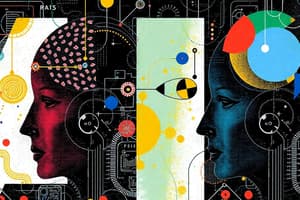Podcast
Questions and Answers
What does the acronym 'AI' stand for?
What does the acronym 'AI' stand for?
- Applied Information
- Artificial Intelligence (correct)
- Automated Interaction
- Advanced Integration
Which of the following describes a primary function of AI?
Which of the following describes a primary function of AI?
- Performing tasks that typically require human intelligence (correct)
- Enhancing human memory
- Conducting scientific research independently
- Emotionally connecting with users
Which of these fields does AI significantly impact?
Which of these fields does AI significantly impact?
- Fashion design
- Event planning
- Agriculture techniques
- Machine learning, robotics, and natural language processing (correct)
What is NOT a typical application of AI?
What is NOT a typical application of AI?
Which statement is an example of AI in everyday use?
Which statement is an example of AI in everyday use?
Flashcards
What is AI?
What is AI?
AI (Artificial Intelligence) is a branch of computer science that focuses on creating intelligent machines that can perform tasks typically requiring human intelligence.
What do AI systems do?
What do AI systems do?
AI systems are designed to learn from data, recognize patterns, make decisions, and solve problems.
What are some uses of AI?
What are some uses of AI?
AI has various applications like self-driving cars, voice assistants, medical diagnosis, and fraud detection.
What are AI algorithms?
What are AI algorithms?
Signup and view all the flashcards
How does AI learn?
How does AI learn?
Signup and view all the flashcards
Study Notes
Defining Artificial Intelligence
- Artificial intelligence (AI) encompasses a broad range of technologies enabling computer systems to perform tasks that typically require human intelligence.
- This includes learning, problem-solving, decision-making, and pattern recognition.
- AI systems are designed to mimic human cognitive abilities, but they often do so through different methods and with varying degrees of success.
Types of AI
- Narrow or Weak AI: Designed for a specific task. Examples include spam filters, recommendation systems (like on Netflix), and facial recognition software. This is the most common type of AI in use today.
- General or Strong AI: Hypothetical AI with human-level intelligence. It can understand, learn, and apply knowledge across a wide range of tasks. Research and development are ongoing, but currently this type of AI does not exist.
- Super AI: Hypothetical AI that surpasses human intelligence in all aspects. This is purely theoretical and its implications are a subject of ongoing discussion
Key Components of AI Systems
- Machine Learning (ML): A subset of AI focusing on enabling systems to learn from data without being explicitly programmed. Algorithms identify patterns and make predictions based on input data.
- Deep Learning (DL): A subset of ML using artificial neural networks with multiple layers to analyze complex data. This allows for highly accurate predictions.
- Natural Language Processing (NLP): Enables computers to understand, interpret, and generate human language. This is crucial for tasks like chatbots, language translation, and sentiment analysis.
- Computer Vision: Allows computers to "see" and interpret images and videos. Examples include image recognition, object detection, and autonomous driving.
AI Applications
- Healthcare: AI can assist in diagnosing diseases, personalizing treatment plans, and drug discovery.
- Finance: AI powers fraud detection, risk assessment, and algorithmic trading strategies.
- Retail: AI is used for personalized recommendations, inventory management, and customer service.
- Manufacturing: AI optimizes production processes, predicts equipment failures, and improves quality control.
- Transportation: AI is crucial for autonomous vehicles, traffic optimization, and logistics.
Ethical Considerations of AI
- Bias: AI systems trained on biased data can perpetuate and amplify existing societal biases, leading to unfair outcomes.
- Job Displacement: Automation driven by AI may lead to job losses in certain sectors.
- Privacy Concerns: The collection and use of data by AI systems raise concerns about privacy.
- Transparency: Lack of transparency in how AI systems make decisions can create uncertainty and distrust.
- Accountability: Determining responsibility when AI systems make errors or cause harm is a significant challenge.
Future of AI
- Advancements in AI are expected to impact various sectors of the economy and society.
- Continued research and development will likely lead to more sophisticated AI systems.
- Ethical considerations and regulations will need to keep pace with the rapid evolution of AI.
- Maintaining human control and oversight are key to responsible AI development.
Studying That Suits You
Use AI to generate personalized quizzes and flashcards to suit your learning preferences.



